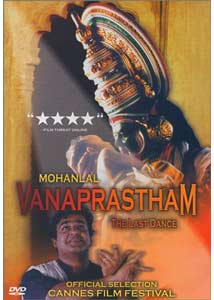Vaanaprastham
| Vanaprastham | |
|---|---|

DVD cover
|
|
| Directed by | Shaji N. Karun |
| Produced by | Mohanlal Pierre Assouline |
| Screenplay by | Shaji N. Karun Raghunath Paleri (Dialogue) |
| Story by | Pierre Assouline |
| Starring |
Mohanlal Suhasini Mattannur Sankarankutty Marar Kukku Parameswaran Venmani Haridas Kalamandalam Gopi Venmani Vishnu |
| Music by | Zakir Hussain |
| Cinematography |
Santosh Sivan Renato Berta |
| Edited by |
A. Sreekar Prasad Joseph Guinvarch |
|
Production
company |
Euro American Films
Pranavam Arts |
| Distributed by | Pranavam Arts (Kerala) |
|
Release date
|
25 December 1999 |
|
Running time
|
119 minutes |
| Country | India France Germany |
| Language | Malayalam |
Vanaprastham - The Last Dance (English: Pilgrimage) is a 1999 Indian-French-German co-production Malayalam language, drama film directed by Shaji N. Karun. It stars Mohanlal, Suhasini, Mattannur Sankarankutty Marar, Kalamandalam Gopi, and Venmani Haridas. The film's music is composed by Zakir Hussain. The film follows the tale of a lower-caste Kathakali artist Kunhikuttan (Mohanlal) during the 1940s era in Travancore. Subhadra (Suhasini), a member of an aristocratic family, falls in love with the character Arjuna played by Kunhikuttan. She views Kunhikuttan and the character he plays as separate individuals. Their affair eventually leads to the birth of a son, who is hidden away by Subhadra from Kunhikuttan for almost a lifetime.
The film was nominated for the Grand Jury Prize at the AFI Los Angeles International Film Festival (AFI Fest) in 1999. It was screened in the Un Certain Regard section at the 1999 Cannes Film Festival. It is considered to be one of Mohanlal's best performances. IBN Live ranked the film #9 in its list of greatest Indian films of all time. The film was screened retrospective, during the 2014 International Film Festival of India in the Celebrating Dance in Indian cinema section.
The story revolves around a male Kathakali dancer Kunhikuttan (Mohanlal), an admirable and respected performer but a member of a lower caste. He struggles to come to terms with the rejection and estrangement of his father, a member of an upper caste who denies his son. Poor, unhappy, and stuck in an arranged marriage that provides no relief, he gets by for the sake of his daughter. One night, whilst performing as Arjuna from the epic Mahabarata on stage, his dance is witnessed by Subhadra (Suhasini), a well-educated member of an upper-caste family. Defying the norms of India's rigid caste system, they have a son, but it soon becomes clear that Subhadra loves the character Arjuna from his stage performances, and not Kunhikuttan the artist. More in love with the valiant, noble hero of the Mahabarata, than the dancer Kunhikuttan, she rejects him and refuses to let him see his son. Denied access to his son, and rejected by his father, Kunhikuttan returns to the stage, leaving behind his hero roles to play demonic characters, reaching within the dark corners of his mind, becoming increasingly resentful and full of anger, until one last dance which brings the feature to a stunning end.
...
Wikipedia
